小学一般将来时讲解 (1)
最新一般将来时知识点总结经典1(1)

最新一般将来时知识点总结经典1(1)一、一般将来时1.Hurry up. The train _________ in twenty minutes.A. leftB. has leftC. is leavingD. has been away【答案】C【解析】【分析】句意:快点。
二十分钟后火车将要离开。
根据时间状语in twenty minutes可知此处用一般将来时,表示位置移动的动词,如leave, go, come等的现在进行时表示一般将来时,故为is leaving,故答案选C。
【点评】考查短暂性的动词的进行时态表将来。
2.I’m so lucky because I see more cartoon characters next month.A. is able toB. will be able toC. be able toD. was able to【答案】B【解析】【分析】句意:我真幸运因为我下个月能看到更多的卡通人物。
next month表将来,因此用will be able to。
故选B。
【点评】考查一般将来时。
3.—Do you know when Mrs. White for dinner this evening?—No, but I think she when she is free.A. will come; will comeB. will come; comesC. comes; will come【答案】 A【解析】【分析】句意:——你知道怀特太太今晚是否来吃晚饭吗?——不知道。
但我认为如果她有空,她会来。
空一,句子为含有宾语从句的主从复合句,主句是一般现在时,从句用它所需要的任何时态,根据this evening今晚,可知句子为一般将来时,will come;空二,回答是when引导的时间状语从句,从句是一般现在时,主句应用将来时,will come,故选A。
小学语法经典总结---一般将来时1

I feel terrible.I think I'm going to die.我感到难受极了,我想我快不行了。
Jack isn’t in.He has gone to the park.杰克布在家,他去超市了。
How long have you been in China?你在中国呆了多久了?
2. a lot of许多的,后面跟可数名词复数形式
3.take photos拍照take pictures
take photos of拍……的照片
He will write a book one day.将来他要写一本书。
(2)be going to表示主观判断将来肯定发生的事情,will表示客观上将势必发生的事情。
Look at those black clouds!It's going to rain.看看那些乌云!天快要下雨了
He will be twenty years old.他快二十岁了。
(3)be going to含有计划准备的意思,而will没有这个意思。
She is going to lend us her book.他准备把书借给我
He will be here in half an hour.他半小时后到。
用所给词的适当形式填空:
1、where are you going to ___________(go) next Mondy?
He will be back soon.他很快就会回来。
I shall/will be free on Sunday.星期天我有空。
英语一般将来时用法详解(1)

点评:固定句式:it be一段时间before从句;当Before引导的时间状语从句中使用一般现在时的时候,前面的主句使用将来时。May放在句首,运用倒装句表示对对方的祝愿。
3.“When he _____ is not known yet.” “But when he ____, he will be warmly welcomed.”
2.---It ______ be only two days before I have the job interview.
---______ you succeed.
A.must; MayB.must; ShouldC.will; MayD.will; Should
【答案】C
【解析】
试题分析:考查倒装句和时态。第一空考查了固定句式中的时态。固定句式:it be一段时间before从句;当Before引导的时间状语从句中使用一般现在时的时候,前面的主句使用将来时。第二空使用倒装句的形式may you succeed祝你成功。
英语一般将来时用法详解(1)
一、单项选择一般将来时
1.Why don’t you put the meat in the fridge? It will_______fresh for several days.
A.be stayedB.stayC.be stayingD.have stayed
【答案】B
考点:考查时态
11.(陕西重点中学高三二模)We pursue happiness, thinking one day we will find it. But ________ it by seeking it.
A.rarely will we findB.rarely we will find
小学一般将来时讲解

小学一般将来时讲解1. 介绍小学一般将来时是英语语法中的一种时态,用来表示将来发生的行动或事件。
在这种时态中,动作与时间的关系是相对的,即动作将在将来某一时刻发生。
2. 构成小学一般将来时由情态动词 "will" 或 "shall" 加上动词原形构成。
下面是一些例子:- I will go to school.- She will play basketball.- We shall see a movie.3. 肯定句结构小学一般将来时的肯定句结构是:主语 + will/shall + 动词原形+ 其他。
4. 否定句结构小学一般将来时的否定句结构是:主语 + will/shall + not + 动词原形 + 其他。
5. 疑问句结构小学一般将来时的疑问句结构是:Will/Shall + 主语 + 动词原形+ 其他?6. 使用场景小学一般将来时常用于以下场景:- 表示未来的计划或打算:I will go to the park tomorrow.- 表示预测:It will rain later.- 表示意愿或请求:Will you help me with my homework?7. 注意事项在小学一般将来时中,我们要注意以下几点:- 不使用"will"或"shall"来表达对他人的承诺或决定,如"I promise"或"I decide"。
- 在口语中,经常使用"will"而不是"shall"。
- 在第一人称疑问句中,我们可以使用"shall"代替"will",但这并不常见。
希望这份文档对你的小学一般将来时的学习有所帮助!。
一般将来时(1)

with us next week.
3. Is the boy going to join
(join) us
tomorrow afternoon?
4. What are his teachers going to do
4. We are going to meet in front of the Garden Theatre. (对画线部分提问) W__h_e_r_e__ a_r_e_______ you going to meet ? 5. I am going shopping with my mother tomorrow. (对画线部分提问)
2. Su Yang’s uncle is going to Shanghai next week.(改成一般疑问句) Is Su Yang’s uncle going to Shanghai next week? 3. Ma Li is going to fly a kite this weekend.(对画线部分提问) What is Ma Li going to do this weekend?
tomorlm.
方法:根据句子结构一部分一部分地写出来
改写句子
The children are going to have a picnic(野餐) tomorrow.
否定句:
The children are not going to have a picnic tomorrow.
We are going to Beijing by plane tomorrow morning. 4 她这个周末准备去放风筝吗?是的,她是。 Is she going to fly a kite this weekend? Yes, she is. 5 苏海和苏阳明天晚上打算干什么?她们准备看一场电影。 What are Su Hai and Su Yang going to do
【英语】复习专题——一般将来时知识点归纳(1)

【英语】复习专题——一般将来时知识点归纳(1)一、一般将来时1.—What is your plan for next weekend, Lingling?—I volunteer work in the museum.A. was doingB. didC. have doneD. am going to do【答案】 D【解析】【分析】句意:——玲玲,你下周末打算干什么?——我要去博物馆做义工。
根据题干中的next weekend,可知此句要用一般将来时,故选D。
【点评】考查一般将来时的基本构成及用法。
2.With the development of science and technology, robot cooks ______ in our families in the future.A. appearB. appearedC. will appearD. were appearing【答案】 C【解析】【分析】句意:随着科学技术的发展,在未来机器人厨师将出现在我们的家庭中. 根据in the future可知,此句表示动作发生在将来,所以用一般将来时态;一般将来时态结构为:will+动词原形,故选C.【点评】判断动词的时态,要通过所给的时间状语、提示词或语境去判断动词存在的状态. 一般将来时态结构为:will+动词原形.3.Michael _________ in a school in Yunnan from February to June next year.A. teachB. taughtC. will teachD. was teaching【答案】C【解析】【分析】句意:Michael将会在明年2月到6月在云南的学校教学。
A动词原形;B一般过去时;C是一般将来时;D是过去进行时。
Next year是一般将来时的时间状语,will+动词原形,故答案为C。
【点评】考查动词的时态,注意句中的时间状语。
小学一般将来时知识点总结

小学一般将来时知识点总结引言小学英语是孩子们学习英语的起点,学好小学英语对以后的学习起到重要的基础作用。
其中,学习一般将来时是非常重要的一部分。
掌握一般将来时的用法可以帮助孩子们表达将要发生的事情,培养他们的语言表达能力。
本文将总结小学一般将来时的知识点。
一般将来时的定义一般将来时表示将要发生的动作或存在的状态。
它通常用于描述将来的事件、习惯或计划等。
一般将来时的构成一般将来时由助动词“will”和动词原形构成。
通常,在句子中,助动词“will”位于主语之后,动词原形位于助动词之后。
例如:•I will go to the park tomorrow.•She will eat dinner at home tonight.一般将来时的用法表示将要发生的事情一般将来时通常用于表示将来要发生的事情。
例如:•I will visit my grandparents next week.•We will have a party on Saturday.表示将来的打算或意愿一般将来时还可以用于表示将来的打算或意愿。
例如:•Tom will study hard to pass the exam.•They will help the homeless people.表示将来的预测有时,一般将来时也可以用于表示将来的预测。
例如:•It will rain tomorrow.•She will become a famous singer in the future.表示意见或推断一般将来时还可以用于表示意见或推断。
例如:•I think he will be successful in his career.•They believe the team will win the game.表示习惯或常态一般将来时还可以用于表示习惯或常态。
例如:•They will usually go for a walk after dinner.•He will always help his classmates.一般将来时的注意事项在使用一般将来时时,有一些需要注意的事项。
(完整版)一般将来时时态用法讲解
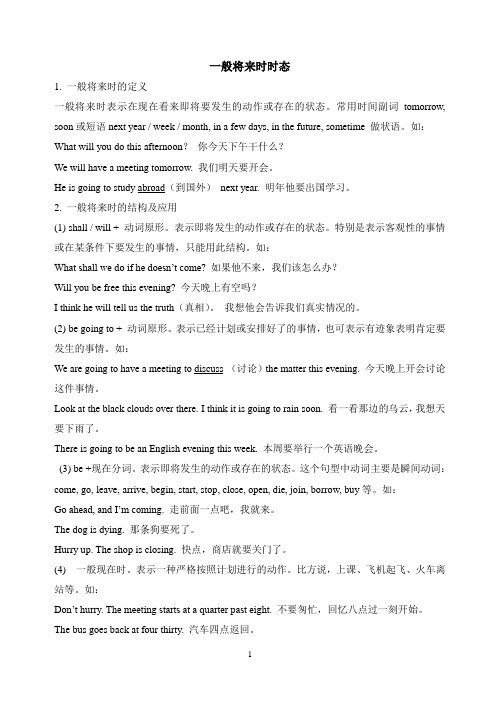
一般将来时时态1. 一般将来时的定义一般将来时表示在现在看来即将要发生的动作或存在的状态。
常用时间副词tomorrow, soon或短语next year / week / month, in a few days, in the future, sometime 做状语。
如:What will you do this afternoon?你今天下午干什么?We will have a meeting tomorrow. 我们明天要开会。
He is going to study abroad(到国外)next year. 明年他要出国学习。
2. 一般将来时的结构及应用(1) shall / will + 动词原形。
表示即将发生的动作或存在的状态。
特别是表示客观性的事情或在某条件下要发生的事情,只能用此结构。
如:What shall we do if he doesn’t come? 如果他不来,我们该怎么办?Will you be free this evening? 今天晚上有空吗?I think he will tell us the truth(真相)。
我想他会告诉我们真实情况的。
(2) be going to + 动词原形。
表示已经计划或安排好了的事情,也可表示有迹象表明肯定要发生的事情。
如:We are going to have a meeting to discuss (讨论)the matter this evening. 今天晚上开会讨论这件事情。
Look at the black clouds over there. I think it is going to rain soon. 看一看那边的乌云,我想天要下雨了。
There is going to be an English evening this week. 本周要举行一个英语晚会。
(3) be +现在分词。
表示即将发生的动作或存在的状态。
(简单)小学一般将来时讲解
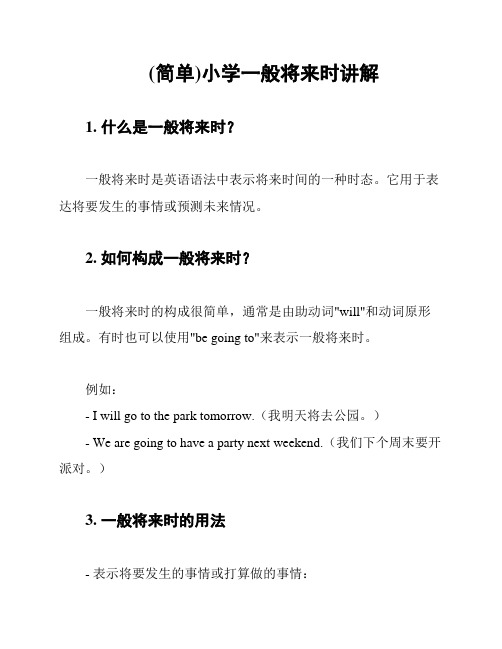
(简单)小学一般将来时讲解1. 什么是一般将来时?一般将来时是英语语法中表示将来时间的一种时态。
它用于表达将要发生的事情或预测未来情况。
2. 如何构成一般将来时?一般将来时的构成很简单,通常是由助动词"will"和动词原形组成。
有时也可以使用"be going to"来表示一般将来时。
例如:- I will go to the park tomorrow.(我明天将去公园。
)- We are going to have a party next weekend.(我们下个周末要开派对。
)3. 一般将来时的用法- 表示将要发生的事情或打算做的事情:- I will call you later.(我等会儿给你打电话。
)- They will have a meeting tomorrow.(他们明天要开会。
)- 表示预测或猜测未来情况:- It will rain this afternoon.(今天下午会下雨。
)- She will probably pass the exam.(她很可能会通过考试。
)- 用于表示意愿、请求、建议、命令等:- Will you help me with my homework, please?(请你帮我做作业好吗?)- You will do as I say.(你要按我说的去做。
)4. 注意事项- 一般将来时通常不能与表示明确的时间状语连用,如"tomorrow"、"next week"等。
- 在第一人称中,可以使用"shall"代替"will",但这在现代英语中很少使用。
- 使用"be going to"时,一般是根据现有迹象进行预测或计划。
5. 例句- She will study abroad next year.(她明年将出国留学。
一般将来时讲解(附习题+答案)

一般将来时讲解(附习题+答案)一、一般将来时的含义:表示动作发生在将来二、一般将来时的句型:(1) will/shall+动词原形(2) be going to+动词原形三、一般将来时的时间状语:tomorrow(明天)、the day after tomorrow(后天)、next...(下一...): next week(下一周)、next year(明年)、next month(下个月)in+一段时间(...之后): in three days(三天之后)、in the future在未来this evening(今天晚上)四、一般将来时的句型结构:(1) will/shall+动词原形(will not =won’t)(will 各种人称均可用,shall 只能用于第一人称)1)肯定句:主语+will/shall+动词原型...如:I will go to school tomorrow.我明天将会去学校He will go to school tomorrow.他明天将会去学校。
2)否定句:主语+will/shall+not+动词原型...如:I won’t go to school tomorrow.我明天将不会去学校。
He won’t go to school tomorrow.他明天将不会去学校。
3)一般疑问句:Will/Shall +主语+动词原型...如:Will you go to school tomorrow?你明天要去学校吗?Will he go to school tomorrow?他明天要去学校吗?肯定回答:Yes, 主语+will.如:Yes, I will.Yes, he will.否定回答:No,主语+will+not.如:No, I won’t.No, he won’t.4) 特殊疑问句:特殊疑问词+will/shall+主语+动词原型...如:What will you do tomorrow?你明天将会做什么?What will he do tomorrow?他明天将会做什么?(2) be going to+动词原形1)肯定句:主语+be going to +动词原型...如:I am going to buy some books tomorrow.我明天打算去买一些书。
小学英语一般将来时
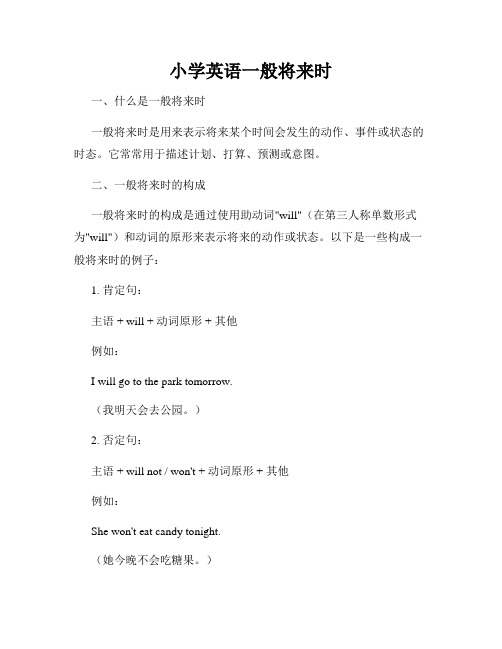
小学英语一般将来时一、什么是一般将来时一般将来时是用来表示将来某个时间会发生的动作、事件或状态的时态。
它常常用于描述计划、打算、预测或意图。
二、一般将来时的构成一般将来时的构成是通过使用助动词"will"(在第三人称单数形式为"will")和动词的原形来表示将来的动作或状态。
以下是一些构成一般将来时的例子:1. 肯定句:主语 + will + 动词原形 + 其他例如:I will go to the park tomorrow.(我明天会去公园。
)2. 否定句:主语 + will not / won't + 动词原形 + 其他例如:She won't eat candy tonight.(她今晚不会吃糖果。
)3. 疑问句:Will + 主语 + 动词原形 + 其他?例如:Will they come to the party?(他们会来参加派对吗?)三、一般将来时的使用场景下面是一些小学英语中常见的使用一般将来时的场景:1. 表示计划或打算:I will visit my grandparents next month.(我下个月会去拜访我的祖父母。
)2. 表示预测或推测:It will rain tomorrow.(明天会下雨。
)3. 表示意愿或承诺:I will help you with your homework.(我会帮你做作业。
)4. 表示未来常态:The school will start at 8:00 AM tomorrow.(明天学校将会在早上8点开始。
)5. 表示请求、命令或建议:Will you please pass me the book?(你能给我递一下那本书吗?)四、注意事项1. "will"后面的动词使用原形形式。
2. 助动词"will"可以缩写成"’ll"。
一般将来时讲解(1)

英语语法(五)一般将来时概念:一般将来时表示将来某个时间要发生的动作,事情或存在的状态,也表示将来经常或反复发生的动作或事情结构:1)will/shall+动词原形shall用于第一人称,常被will 所代替。
will 在陈述句中用于各人称,2)be going to +不定式,表示将来。
表示主观的打算或计划。
例如:a. 主语的意图,即将做某事。
例如:What are you going to do tomorrow?I'm going to play football tomorrow afternoon. (主观安排)b. 计划,安排要发生的事。
例如:The play is going to be produced next month。
这出戏下月开播。
c. 有迹象要发生的事。
例如:Look at the dark clouds, there is going to be a storm.3)be +不定式表将来,按计划或正式安排将发生的事。
表示客观安排或受人指示而做某事We are to discuss the report next Saturday.I am to play football tomorrow afternoon. 明天下午我去踢球。
(客观安排)4)be about to +不定式,意为马上做某事。
例如:He is about to leave for Beijing. 他马上要去北京。
注意:be about to do 不能与tomorrow, next week 等表示明确将来时的时间状语连用。
5).现在进行时表将来时有些表趋向性的动词可用现在进行时来表示将来时:e.fly.leave.start.begin.finish.end.arrive 。
she is leaving for Wuhan tomorrow.6)、There be 句型的一般将来时:There will be… / There is going to be…7).一般将来时的时间状语1。
英语一般将来时讲解

英语一般将来时讲解1.句型结构①助动词will / shall + 动词原形一般将来时表示将来要发生的动作或存在的状态,常与表示将来的时间状语tomorrow,next time,in the future,in+时间段,soon等连用,其结构为“will/shall+动词原形”。
其中will可用于各种人称;shall主要用于第一人称的句子中,尤其是在疑问句中,当主语为第一人称时,通常用shall。
例如They will go swimming tomorrow.Where shall we go for our holidays?②be going to+动词原形“be going to+动词原形”表示将要发生的动作或安排、打算,或有某种迹象表明即将发生某事。
③其他可表示将来的时态:(1)现在进行时可表示计划或准备要做的事;(2)一般现在时可表示按计划要发生的事。
例如:The Smiths are going shopping tomorrow.The final bus leaves at 7:00 p.m.2.一般疑问句: Will + 主语 + 其他?肯定句:Yes , 主语 + will.否定句: No, 主语 + won’t.例如:Will they have more time?肯定句: Yes, they will.否定句: No, they won’t.6. there be句型的一般将来时: There will be ……表示“将有……”。
例如:There will be more cars in the future.3. there 句型的肯否定句there be是原形;表示某处有某物there will be、there is going to be是there be句型一般将来时的表现形式。
例如:There is going to be a concert tomorrow.There are going to be two new zoos built next week.肯定句:There + will be + 其他否定句: There + won't be. + 其他一般疑问句:Will + there+ be + 其他?回答:Yes, there will. / No, there won’t. 例如:There will be more food.。
小学一般将来时讲解精选版

小学一般将来时讲解 Company number【1089WT-1898YT-1W8CB-9UUT-92108】小学一般将来时讲解与练习一、一般将来时的定义:一般将来时表示在将来时间将要发生的动作或存在的状态,与表示将来的时间连用。
tomorrow, next day(week, month, year…),soon, the day after tomorrow(后天)等。
如:She will visit Shanghai tomorrow.二、一般将来时的构成(一)一般将来时有两种构成形式:1.主语+shall/will+do2. 主语+ be going to + do 在表示“打算到某地去时”由于谓语动词go与going重复,一般可以只说be going to a place。
三、一般将来时的用法(一)1.主语+shall/will+do (will可用于所有人称,shall只用于第一人称I和we) 这种结构不是表示自己的打算、意图或计划,而是表示未来的事实或对将来的预测等如:No one will do heavy work.Roberts will do everything for us.2.主语+ be going to + do这种结构常用来表达自己打算做某事、计划做某事或者有意做某事。
注意:be 动词要与主语的人称和数一致,如:I am going to do some reading tomorrow.He is going to have a piano lesson next week.We are going to have a party this Friday.(二)通常情况下will 和 be going to能互换,但是be going to 与will 用法的也是有点区别的1. 只用will不用be going to的情况:①表示对未来时间与年龄的推测时,如:Tomorrow will be Monday.She will be thirteen next year.②表示必然发生时,如:Fish will die without water.People will die if all green plants die.2.只用be going to而不用will的情况:如果表示已有迹象表明在不久的将来要发生的事情时,如:Look at those black clouds, It’s going to rain.(三)某些动词如:go/come/leave/start/begin/arrive等,它们的现在进行时可以表示将来时,如:They are leaving for Shanghaitomorrow.My brother is coming here soon.四、一般将来时的句式变换肯定句:主语+shall/will+do主语+ be going to + do否定句:主语+shall/will+not+do(will not 可缩写成won’t)主语+ be+ not+ going to +do一般疑问句:shall/will+主语+ dobe+主语+going to+do特殊疑问句:疑问词+ shall/will+主语+do疑问词+be+主语+going to+do五.巩固练习一、按要求填空1. 我打算明天和朋友去野炊。
一般将来时提问句型知识点讲解

一般将来时提问句型知识点讲解一般将来时是英语中表示将来发生或将要发生的动作或状态的时态。
在构成提问句时,需要利用助动词和主语的位置来完成句子结构。
以下将针对一般将来时提问句型的知识点进行详细讲解。
1. 一般将来时的构成一般将来时的构成方式是:助动词“will”或“shall” + 动词原形。
例如:I will go to the park tomorrow.(我明天会去公园。
)2. 提问句型一:一般将来时的一般疑问句在构成一般将来时的一般疑问句时,需要将助动词“will”置于主语之前。
肯定回答时使用“Yes, 主语+ will.”的结构,否定回答则使用“No, 主语+ will not.”。
例如:Will you come to the party tomorrow?(你明天会来参加派对吗?)3. 提问句型二:一般将来时的特殊疑问句一般将来时的特殊疑问句是通过特殊疑问词来引导疑问内容的构成。
特殊疑问词置于句首,然后依然遵循助动词“will”+ 主语 + 动词原形的结构。
例如:When will you finish your homework?(你什么时候会完成作业?)4. 提问句型三:一般将来时的选择疑问句选择疑问句是一种结合两种句子形式的疑问句,用于提出两种或几种可能性,询问对方的选择。
构成方式是助动词“will”置于第一个句子主语之前,第二个句子主语+ will + 动词原形。
例如:Will she go shopping or watch a movie tonight?(她今晚是去购物还是看电影?)5. 小结通过以上讲解,我们可以清晰地了解一般将来时提问句型的知识点。
在日常学习和交流中,灵活运用这些句型可以更准确地表达自己的意图,也有助于提高英语口语的流利程度。
希望以上内容对大家有所帮助,提高英语学习效率。
一般将来时讲解知识讲解
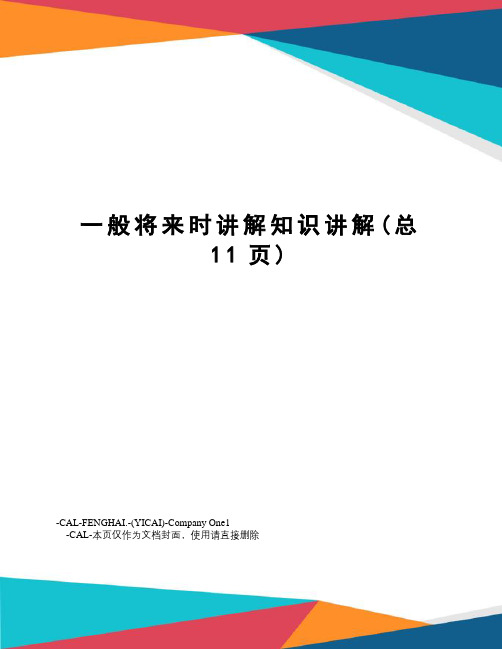
一般将来时讲解知识讲解(总11页)-CAL-FENGHAI.-(YICAI)-Company One1-CAL-本页仅作为文档封面,使用请直接删除一般将来时讲解一般将来时讲解主要用来描述将要发生的动作或存在于未来的情况。
这里所说的“将来时间”是指“说话、写文章那一刻以后的时间”。
◆一般将来时标志: tomorrow, next day(week, month, year…) , soon,in a few minutes, by…, the day after tomorrow…◆一般将来时用法(1)一般将来时表示将要发生的动作或情况。
例如:I will(shall) arrive tomorrow.我明天到。
Will you be free tonight 你今晚有空吗We won’t (shan’t) be busy this evening. 我们今晚不忙。
(2)在一般将来时的句子中,有时有表示将来时间的状语,有时没有时间状语,这时要从意思上判断是否指未来的动作或情况。
例如:Will she come 她(会)来吗We’ll only stay for two weeks. 我们只待两星期。
The mee ting won’t last long. 会开不了多久。
(3)在以第一人称I或we作主语的问句中,一般使用助动词shall,这时或是征求对方的意见(a),或是询问一个情况(b):a. Where shall we meet 我们在哪儿碰头b. Shall we have any classes tomorrow明天我们有课吗在这类问句中,近年来也有不少人用will,特别是在美国。
例如:How will I get there 我怎么去(4)be going to+动词原形a.表示打算、准备做的事。
例如:We are going to put up a building here.我们打算在这里盖一座楼。
小学英语语法时态一般将来时详解
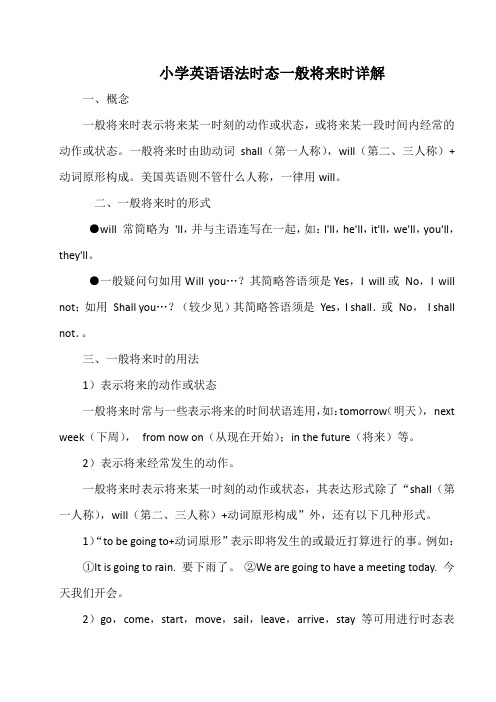
小学英语语法时态一般将来时详解一、概念一般将来时表示将来某一时刻的动作或状态,或将来某一段时间内经常的动作或状态。
一般将来时由助动词shall(第一人称),will(第二、三人称)+动词原形构成。
美国英语则不管什么人称,一律用will。
二、一般将来时的形式●will 常简略为'll,并与主语连写在一起,如:I'll,he'll,it'll,we'll,you'll,they'll。
●一般疑问句如用Will you…?其简略答语须是Yes,I will或No,I will not;如用Shall you…?(较少见)其简略答语须是Yes,I shall.或No,I shall not.。
三、一般将来时的用法1)表示将来的动作或状态一般将来时常与一些表示将来的时间状语连用,如:tomorrow(明天),next week(下周),from now on(从现在开始);in the future(将来)等。
2)表示将来经常发生的动作。
一般将来时表示将来某一时刻的动作或状态,其表达形式除了“shall(第一人称),will(第二、三人称)+动词原形构成”外,还有以下几种形式。
1)“to be going to+动词原形”表示即将发生的或最近打算进行的事。
例如:①It is going to rain. 要下雨了。
②We are going to have a meeting today. 今天我们开会。
2)go,come,start,move,sail,leave,arrive,stay等可用进行时态表示按计划即将发生的动作,例如:I'm leaving for Beijing. 我要去北京。
3)“be to+动词原形”表示按计划要发生的事或征求对方意见。
例如:①Are we to go on with this work?我们继续干吗?②The boy is to go to school tomorrow.这个男孩明天要去上学。
- 1、下载文档前请自行甄别文档内容的完整性,平台不提供额外的编辑、内容补充、找答案等附加服务。
- 2、"仅部分预览"的文档,不可在线预览部分如存在完整性等问题,可反馈申请退款(可完整预览的文档不适用该条件!)。
- 3、如文档侵犯您的权益,请联系客服反馈,我们会尽快为您处理(人工客服工作时间:9:00-18:30)。
小学一般将来时讲解与练习
一般将来时的定义
状态,也表示将来经常或反复发生的动作或事情。
二、与表示将来的时间连用。
tomorrow, next day(week, month, year…),soon, the day after tomorrow(后天)等。
如:She will visit Shanghai tomorrow.
三、一般将来时的构成
(一)一般将来时有两种构成形式:
1.主语+shall/will+do
2. 主语+ be going to + do在表示“打算到某地去时”由于谓语动词go与going 重复,一般可以只说be going to a place。
四、一般将来时的用法
(一)1.主语+shall/will+do (will可用于所有人称,在征求意见时常用于第二人称;shall只用于第一人称I和we) 这种结构不是表示自己的打算、意图或计划,而是表示未来的事实或对将来的预测等如:
No one will do heavy work.
Roberts will do everything for us.
Which paragraph shall I read first?我先读哪一段呢?
Will you be at home at seven this evening? 今晚七点回家好吗?
( will not=won't shall not=shan't )
2.主语+ be going to + do这种结构常用来(表达自己打算做某事、计划做某事或者有意做某事)。
注意:be 动词要与主语的人称和数一致,如:
I am going to do some reading tomorrow.
He is going to have a piano lesson next week.
We are going to have a party this Friday.
(二)通常情况下will 和 be going to能互换,但是be going to 与will 用法的也是有点区别的
1. 只用will不用be going to的情况:
①表示对未来时间与年龄的推测时,如:
Tomorrow will be Monday.
She will be thirteen next year.
②表示必然发生时,如:
Fish will die without water.
People will die if all green plants die.
2.只用be going to而不用will的情况:
Look at those black clouds, It’s going to rain.
(三)某些动词如:go/come/leave/start/begin/arrive等,它们的现在进行时可以表示将来时,如:
They are leaving for Shanghaitomorrow.
My brother is coming here soon.
五、一般将来时的句式变换
肯定句:主语+shall/will+do
主语+ be going to + do
否定句:主语+shall/will+not+do(will not 可缩写成won’t)
主语+ be+ not+ going to +do
一般疑问句:shall/will+主语+ do
be+主语+going to+do
特殊疑问句:疑问词+ shall/will+主语+do
疑问词+be+主语+going to+do。
